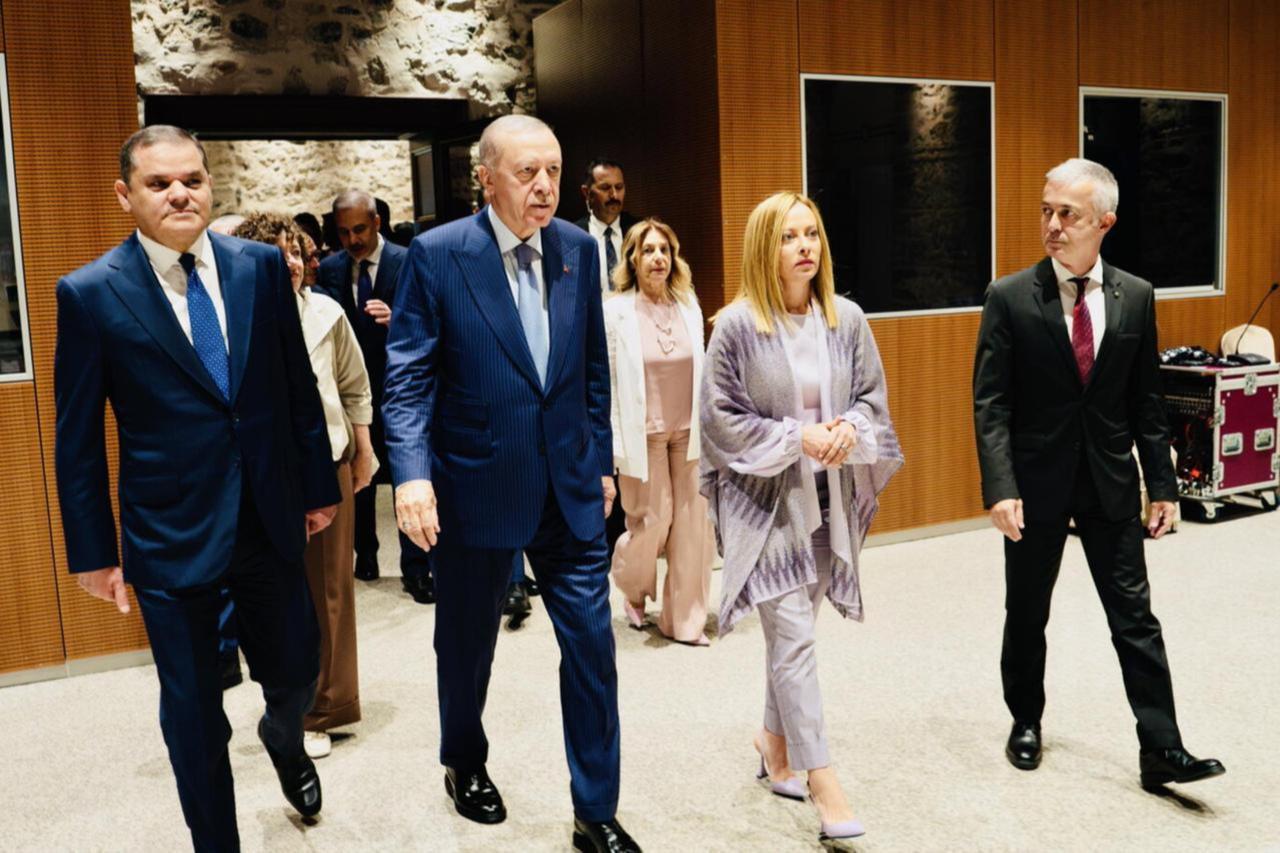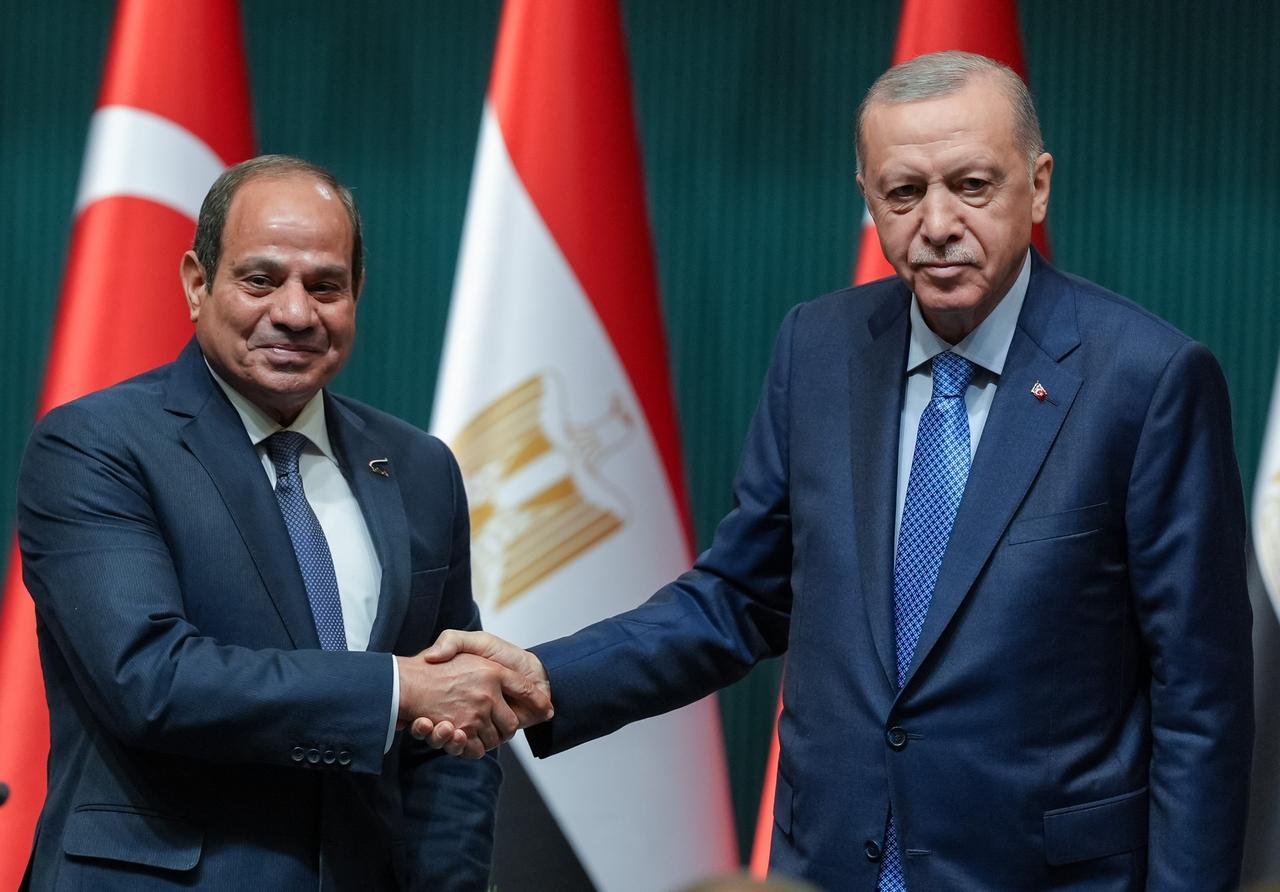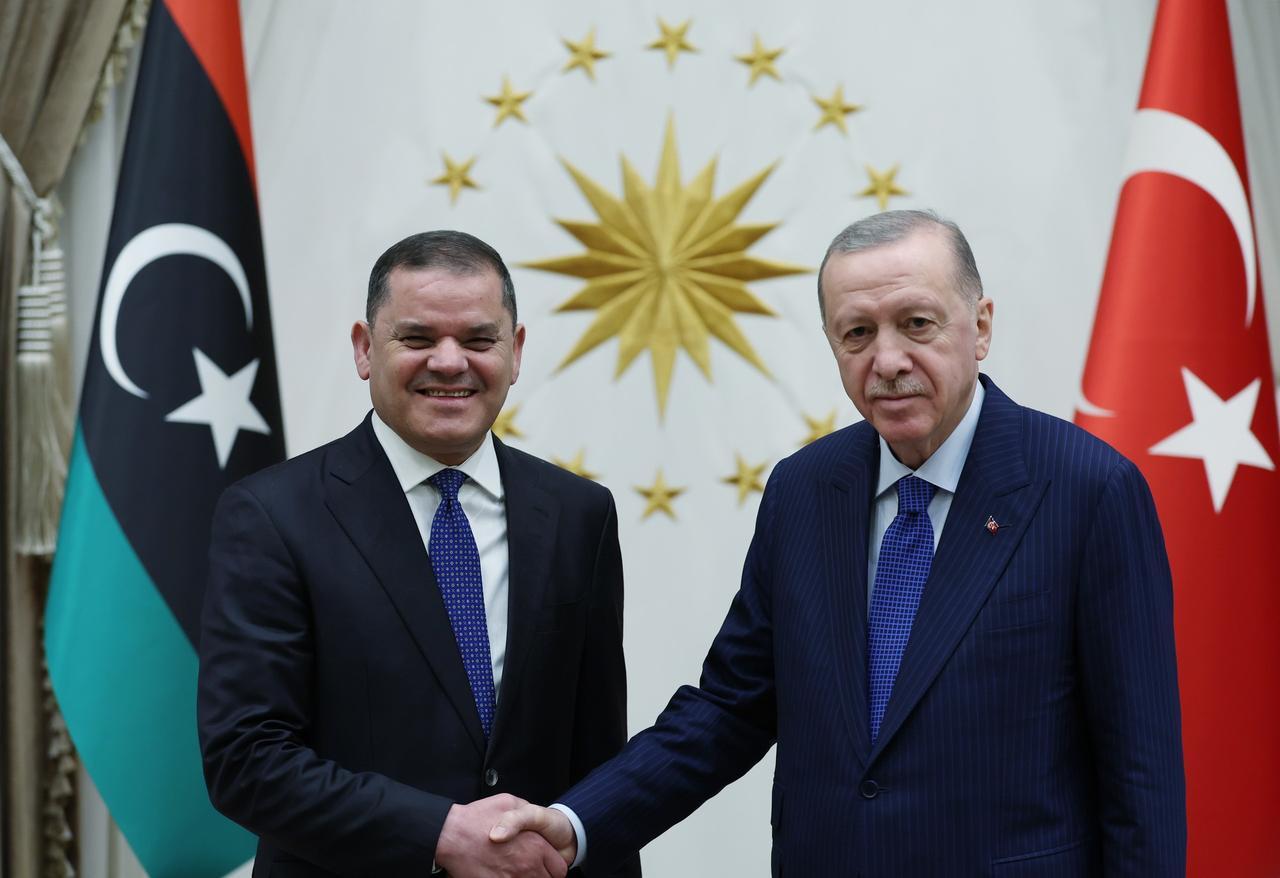
A few weeks ago, Greek Prime Minister Mitsotakis proposed establishing a regional cooperation initiative with Cyprus, Egypt, Türkiye and Libya to cooperate on migration, marine environment protection, connectivity, and, most importantly, to address disputes over maritime zones.
It is quite a surprising development that Greece, which has sought to exclude Türkiye from every possible equation and platform related to the Eastern Mediterranean for years, now wants to initiate a forum where it can consult with Türkiye.
Of course, behind this development lies Türkiye’s increasing influence, both in Libya and in the broader international arena, as well as the United States’ desire to open up opportunities for American companies looking to increase their activities in the region; Washington is also consulting with Italy and Türkiye on Libya policy.
President Erdogan and Prime Minister Meloni, who hosted Libya’s GNU Prime Minister Debiah in Istanbul, are also developing their relations with the administration in eastern Libya. Thus, the U.S., Türkiye, and Italy are aligning their strategies in Libya and are adopting a "balanced engagement model" to address the country's political and economic divide.
After visiting both governments in Libya this summer, Massad Boulos, U.S. Senior adviser (and father of U.S. President Donald Trump’s son-in-law), visited Turkish and Italian Foreign Ministers in August and September, and met with Greek Prime Minister on the sidelines of the U.N. General Assembly meetings in New York.
What accelerated these developments was Greece's approval in May 2025 of an international tender for hydrocarbon exploration in four blocks in the Mediterranean Sea.
This was objected to the following month by authorities in both Tripoli and Benghazi, who criticized the issuance of exploration tenders in disputed Mediterranean waters bordering Libya. The next month, Libya’s National Oil Company (NOC) and Türkiye’s state oil company (TPAO) signed a Memorandum of Understanding to conduct geological and geophysical studies in four offshore zones.
Greece objected to this agreement, declaring it illegal, and brought the matter to the EU Summit, which published a declaration on June 26 defending Greece's position and denouncing the agreement.
In August, the Benghazi-based Parliament's potential approval of the 2019 EEZ Agreement signed between Türkiye and Tripoli raised alarms in Greece. In October, Greece announced that it had assigned the drilling tender to a consortium led by the US energy company Chevron. In August, the Libyan National Oil Company (NOC) signed a memorandum of understanding with ExxonMobil.

In January 2019, with the U.S. and EU support, the Eastern Mediterranean Gas Forum was established among Cyprus, Egypt, France, Greece, Israel, Italy and Jordan, excluding Türkiye from the East Med energy cooperation.
At that time, Türkiye's diplomatic relations with Israel and Egypt, two of the members of the Forum, were at very low levels. Diplomatic relations with Israel had never fully recovered since the Mavi Marmara incident, and Türkiye's relations with Egypt were strained, particularly due to opposition and inflammatory statements exchanged between President Erdoğan and Egyptian President Sisi, who came to power after a military coup overthrowing Türkiye-supported President Morsi.
Türkiye was at odds with Cyprus and Greece over the Exclusive Economic Zones (EEZ) in the Eastern Mediterranean. As Greek Cypriot authorities awarded hydrocarbon exploration rights to several companies in the waters overlapping Türkiye-claimed areas, where Türkiye started sending its oil and gas drilling ships to explore energy sources. Türkiye’s exploration activities attracted a lot of criticism, especially from European countries and the European Union, which suspended high-level dialogues and imposed sanctions on Turkish citizens in 2020; these sanctions were later extended until November 2025.
By that time, Türkiye had no relations with the Hafter-led administration in eastern Libya, which was considered the key interlocutor by Russia, Egypt, the UAE, and indirectly by France. Greece’s EEZ agreements signed with Israel, Cyprus and Egypt, overlapped Türkiye’s claimed rights in the Eastern Mediterranean.
In Syria, while Türkiye was supporting the opposition, Russia supported the Assad regime and used the country as its gateway to the Mediterranean through its military and naval bases there.
In the first term of President Trump in 2019, Türkiye was excluded from the F-35 joint air fighter program due to its purchase of the Russian S-400 missile defense system, and soon afterward, it faced CAATSA sanctions. Türkiye, which had severed relations with the Gulf Cooperation Council (GCC) countries due to its support for Qatar in the Gulf crisis, was isolated from regional equations. Cyprus and Greece took full advantage of Türkiye’s isolation to push their own interests and arguments in the East Med.
Fast forward to 2025, and we witness an entirely different picture. Türkiye has normalized its relations with Egypt, and these relations are developing on multiple fronts, including economic, political, and defense domains.
In Syria, the Assad regime has been overthrown, and with Türkiye maintaining close ties with the new regime, its influence in the region has grown. While Russia may keep some military influence in Syria, its main Mediterranean access would probably be realized through Libya, where it reportedly transferred significant amounts of military assets from Syria.
Although relations with Israel remain severed, the fact that Israel is preoccupied with the Gaza war and that Iran is losing influence in the Middle East has created a new balance of power that strengthens Türkiye’s position.
Türkiye has adopted a policy of supporting both Libyan governments and has undeniably strengthened its influence in Libya to the point that several reports mentioned a potential ratification by the House of Representatives (HoR) of the 2019 maritime deal concluded with the GNU. If ratified, the deal will allow Türkiye to claim sovereign rights in the South of Crete in areas overlapping with the 2020 Greece-Egypt EEZ agreement.
In Italy, under Prime Minister Meloni, elected in 2023, Türkiye has strengthened its relations through a strategic cooperation. This cooperation is focused on defense industry cooperation, policy alignment in Libya, aiming to ensure regional security, managing migration flows, and fostering energy cooperation in the Eastern Mediterranean.
Under the second Trump administration, relations with Türkiye are progressing much closer. While key issues remain unresolved, Türkiye has gained significant consideration from the U.S., which is willing to lean on Türkiye, among a few others, to work on resolving regional issues, which has prompted Western European countries to reassess their positions about Türkiye.

Following its exclusion from the Eastern Mediterranean Gas Forum in November 2019, Türkiye signed a Memorandum of Understanding on the Delimitation of Maritime Jurisdiction Areas (EEZ Agreement) with the UN-recognized Government of National Unity (GNU) in western Libya.
In May 2020, with Turkish drones’ support to the GNU, the war between the western Tripoli-based government and General Haftar's forces shifted in favor of the GNU. Türkiye helped the GNU regain strategic positions, notably at Al-Watiya Air Base, and supported the retake of almost all of western Libya.
Following this victory, Türkiye established its first military air base in the southern Mediterranean at Al-Watiya Air Base.
Since May 2020, Türkiye has been operating from its naval and land bases in Misrata and its air base at Al-Watiya. With the November 2020 security and military cooperation and 2024 intelligence sharing and law enforcement agreements, the Turkish Armed Forces deployed troops, military advisors, attack drones, air defense systems, tactical missiles, and electronic warfare systems to develop the Libyan army's capabilities.
Through its maritime and defense cooperation agreements with the Tripoli government, Türkiye has become an important political and military actor in Libya.
Given the fragile balance of power in Libya and to avoid overreliance on one side, Ankara decided to pursue hedging strategies and has begun to engage with the eastern Libyan administration led by Khalifa Haftar. Another reason to balance its relations in Libya was Türkiye’s willingness to normalize its relations with Egypt.
Türkiye’s support for the GNU was an obstacle to furthering Türkiye-Egypt relations. The first signs of this policy shift emerged in April this year, when Saddam Hafter, son of Khalifa Hafter, visited Türkiye and met with Türkiye's Minister of National Defense and senior military officials. In May, Haftar’s forces joined the Anatolian Phoenix 25 joint military exercises with the Turkish army.
At the beginning of September, following a meeting between Türkiye’s National Intelligence Organization (MIT) head, Ibrahim Kalin, and Hafter in Libya, rumors increased that Hafter might visit Türkiye soon.
This strengthening of cooperation with the Hafter government increases the likelihood that the Benghazi-based Parliament (HoR) would approve the 2019 EEZ agreement signed between Türkiye and Tripoli.
This would be a significant turning point for Türkiye’s sovereign rights and energy exploration activities in the Eastern Mediterranean.
While Ankara develops relations with both sides in Libya, its broader strategic goal is to contribute to the reconstruction of Libyan state institutions, promote national reconciliation through the “United and Single Libya” program, and secure its economic rights in the Eastern Mediterranean.
Ankara is also trying to strengthen its renewed economic presence in Eastern Libya through defense exports and through construction projects carried out by Turkish companies, including reconstruction projects in Derna, which was devastated by a storm.
Greece’s recent shift towards seeking cooperation with Türkiye in the Eastern Mediterranean signals a dramatic change in regional dynamics. Once focused on isolating Türkiye from regional equations, Greece now faces Türkiye’s growing influence in Libya and the broader region, as well as its close relations with the U.S. and Italy.
A long-term solution in the region will only be possible through broad regional cooperation and an inclusive approach. Let’s hope Greece is sincere in its willingness to cooperate.